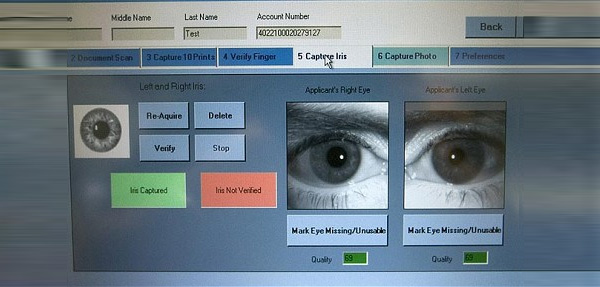| Despite Privacy Concerns, Mexico Continues Scanning Youth Irises for ID Cards Gabriela Manuli - Electronic Frontier Foundation | |
| go to original September 1, 2012 |
|

For more than a year and a half, the Mexican government has been collecting an unprecedented amount of biometric data from minors ages 4 to 17 as part of a youth ID card program. The Personal Identity Card for minors, a document authorities say is intended to help streamline registration in schools and health facilities, comes embedded with digital records of iris images, fingerprints, a photograph, and a signature for each minor.
Documents obtained by EFF under Mexico’s Transparency and Access to Information Act show that as of this past May, nearly 4 million minors had been enrolled into registries associated with the new ID. Public records also revealed that more than 1.2 million ID cards had been issued in the states of Baja California, Baja California South, Colima, Chiapas, Distrito Federal, Guanajuato, Jalisco, Sinaloa, and Morelos. Of those who were issued cards, 1,345 had to go through the registration process again because the quality of their biometric data was inadequate for identification.
The ID card project is part of the integration of Mexico’s National Population Register (RENAPO), which is intended to provide a unique identity system to conclusively prove identities of all Mexican citizens. Under the program, the Ministry of the Interior will issue Citizen Identity Cards and Personal Identity Cards containing biometric information, first to youth, and later extending to Mexico’s entire adult population.
Since July of 2009, when President Felipe Calderón officially announced the creation of RENAPO, numerous observers have sounded the alarm that the endeavor violates individuals' privacy rights. Despite serious concerns raised by a governmental accountability agency and a special commission tasked with studying the program, in January of 2011 Mexico nevertheless became the first country in the world to use iris scans as a component of ID cards.
Mexico’s Secretary of Government (SEGOB) claims that the use of iris recognition, along with other biometric data, serves to combat crime such as human trafficking and to streamline registration and enrollment procedures in schools and health care programs. In official statements, SEGOB claims that "it is a free, official document containing biometrics that make it impossible to forge.” Although Mexican authorities argue that the new document will be 99 percent reliable and “one of the safest in the world,” security researchers have shown otherwise, recently demonstrating security flaws even in ostensibly trustworthy iris scanners.
In April of 2010, The Federal Institute for Access to Public Information (IFAI), an autonomous organization established by Mexico’s freedom of information law to promote a new regime of government transparency, issued a 91-page report outlining the problems associated with such biometric IDs, putting forward several alternative recommendations. The IFAI concluded that requiring just one fingerprint would yield a 99 percent reliability rate, and that the collection of any additional biometric data is wholly unnecessary. The report was also critical of the fact that there are currently no legal protections regulating the use of iris images in Mexico.
IFAI ultimately recommended that Mexico remove some of the biometric data on the new ID cards by gradually reducing the amount of data required. The report argued that capturing the image of both irises, plus ten fingertips, was not proportional to the stated objective of the program. IFAI further concluded that any biometric ID system should be subjected to periodic third-party verifications of the collection, storage, and use of biometric data. Aside from these concerns, IFAI cited huge costs of the project, a lack of transparency in the bidding process, and the risks the program poses to the right to privacy.
We invite you to add your charity or supporting organizations' news stories and coming events to PVAngels so we can share them with the world. Do it now!
Celebrate a Healthy Lifestyle
 From activities like hiking, swimming, bike riding and yoga, to restaurants offering healthy menus, Vallarta-Nayarit is the ideal place to continue - or start - your healthy lifestyle routine.
From activities like hiking, swimming, bike riding and yoga, to restaurants offering healthy menus, Vallarta-Nayarit is the ideal place to continue - or start - your healthy lifestyle routine.